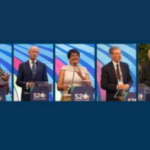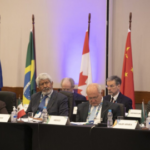Advances in Science and Technology rely on taxation of large fortunes, says Minister of STI
MARCH 11TH | VALOR-RIO
Read article by Victoria Netto, published in Valor-Rio, on 11/3:
Brazilian Minister of Science, Technology, and Innovation (MCTI), Luciana Santos, stated on Monday (11) that taxing large fortunes can also serve as a vector for investments in science and technology at both the national and global levels. The statement was made during the G20 Science (S20) event, which takes place on Monday (11) and Tuesday (12) in Rio.
The S20 is the engagement hub of the G20 – a group that brings together the 19 largest economies in the world, along with the European Union (EU) and the African Union – for science and technology, involving the Science Academies of member countries.
Debates take place annually, coordinated by the Science Academy of the country presiding over the G20. This year, discussions will focus on five axes: bioeconomy, health challenges, artificial intelligence (AI), social justice, and the energy transition process.

Brazilian Minister for Science and Technology, Luciana Santos | Photo: Marcos André Pinto/ABC Disclosure
At the event, Santos said that “it is not possible to advance in large investments in science and technology” without addressing macroeconomic issues. Any perspective of a leap in tackling inequality requires a significant investment, and I agree with the agenda of the Brazilian Minister of Economy that the agenda of large fortunes is necessary for the debate on income distribution worldwide and is no different in Brazil,” she said.
At the end of February, Brazilian Finance Minister Fernando Haddad proposed that countries around the world unite to tax large fortunes in his opening speech at the 1st Meeting of Finance Ministers and Presidents of Central Banks of the G20 Finance Track.
This year, under the presidency of Brazil, the G20 agenda revolves around three main axes: combating global warming and promoting sustainable development; social inclusion and combating hunger and poverty; and reform of global institutions.
Cooperation
According to Minister Luciana Santos, the agreement between Mercosur and the European Union remains a priority agenda item during Brazil’s presidency of the G20 this year. She mentioned international cooperation to reduce inequalities between developed economies in the Northern Hemisphere and developing countries in the Global South. “We are determined to make the Mercosur agreement, which has been decades in the making and hasn’t materialized, a reality. We had a good conversation with the Prime Minister of Spain [Pedro Sánchez], who was here last week, and he also agrees. We believe that, with the safeguarding of public procurement and local content, it is possible to make these technology transfer agreements. It interests Europe and it interests the Mercosur countries, as long as the premise is indeed mutual assistance,” she said.
The minister listed, as examples, the flexibilization of patents, which is a “very dear” issue for Brazil. “Without this vector, the processes of different regional asymmetries are very harmful, even to the countries considered developed,” she said.
According to her, Brazil intends to place the issue of global asymmetries in access, development, and production of science and technology at the center of the G20 presidency.
In her opening remarks, the minister said that Brazil is working in partnership with UNESCO, focusing on the use of artificial intelligence (AI) for governments and companies to concretely improve the lives of different groups, especially marginalized ones. The representativeness of local, racial, and geographical contexts is also on the table.
According to Santos, the scientific academic community will “do its part” to collaborate in formulating public policies and global regulations on issues that generate conflicts of economic interest, such as AI and the energy transition.
“These interests need to be nuanced based on a political will of the countries, whether those that have a greater accumulation in certain areas of knowledge or those seeking common challenges to address this inequality. We will need a governmental and political plan to enforce economic agreements that can transcend the interest of overcoming technological backwardness,” she told journalists.
There is also a focus in the country on bioeconomy for sustainable development. “It is very difficult to have a country with the diversity of biomes that we have; this potential is incomparable, so we need to harness this natural vocation for development and inclusion,” she said.
Brazilian Leadership
One of the ten programs of the National Fund for Science and Technology is combating hunger, said the MCTI minister, in relation to one of the priorities of the G20 under Brazilian presidency.
The initiative is being developed with Brazil’s Minister of Agrarian Development and Family Agriculture, Paulo Teixeira, and the Brazilian Development Bank (BNDES).
Brazil hopes to share, in the multilateral effort to combat hunger worldwide, the expertise acquired with the Brazilian Agricultural Research Corporation (Embrapa), created in 1973 to develop the technological basis of a model of tropical agriculture and livestock.
“Our Embrapa already has experience in Africa and Latin America, and we want it to resume this important role,” she said. “It is part of our internationally recognized excellence system, with social technologies that historically Brazil has been and continues to be an exporter of,” said the minister.




